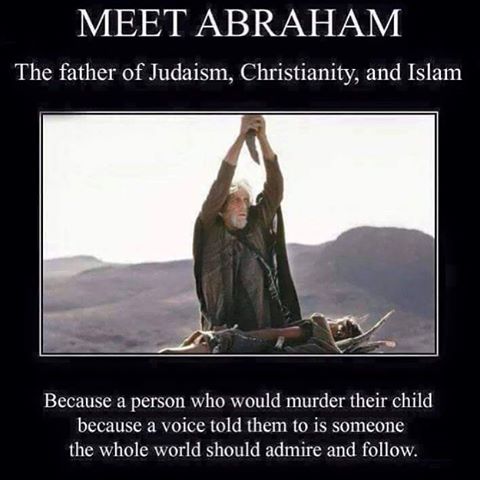
Many who label themselves “Christian” don’t realize that the Quran contains more details about the life of Jesus than does the Bible. (Apparently, the Constantinian editors of the Bible found many of those details counterproductive to their efforts at centralization.) And many modern-day Muslims live much closer to the teachings of Jesus than do modern-day folks with the “Christian” label. Muslims have stood strong against usury. But even more important are the decentralized, family-based support structures around which much of the Muslim culture is based vs the centralized/coercive social support structures of the west. Nevertheless, the beliefs of modern Muslims have become as unhinged from the original teachings of Abraham as have those of the so-called “Christians” and Jews.
One can easily google to find out that Abraham is considered the father of three major religions: Judaism, Christianity, and Islam. Add to that…
- Hinduism: The history of Brahma and the resemblance to details of Abraham’s life are uncanny. ((http://www.eoht.info/page/Abraham+and+Brahma))
- Buddhism: Buddha was a social reformer who began part of his teachings as a Brahman priest of what would become the Hindu religion. Also, Buddhists apparently consider Buddha Issa to be the most important, i.e., Buddha Jesus.
Additionally, there is evidence that Abraham was Egypt’s pharaoh Amenemhet I who worshiped the god “Amen.” This synchronizes well with story of Jacob and his sons eventually returning to Egypt for provision and the parents of Jesus fleeing to Egypt early in his life. ((The Hebrew Pharaohs of Egypt: The Secret Lineage of the Patriarch Joseph by Ahmed Osman)) It also falls in line with the assertion of Josephus Flavius that the Israelites of the Exodus were the Hyksos pharaohs of Egypt—the dynasty following Amenemhet.

Going back even farther, connections have been made to a time of pre-history that every ancient culture pointed to in which Saturn was the “first sun.”
In one form or another, every culture that remembered Saturn’s reign regarded the planet-god as the Father of Kings, the Father of the Nation or the Race. Ancient traditions identified the Ugaritic and Hebrew El as Saturn. And it was said that the Israelites once saw themselves as Saturn’s children…
But there was a dark side to Saturn, reflecting the catastrophic end of the Golden Age… It’s almost impossible to believe that people sacrificed their own children, either symbolically or literally to the planet-god Saturn. Saturn was remembered as the devourer of his own children and as Moloch, demanding sacrifice and as El or Elohim commanding Abraham to sacrifice his own son, Isaac. ((Symbols of an Alien Sky Documentary))
The point is, the disagreements between us are the result of all the mystical mumbo jumbo that has been layered on throughout the centuries by centralizers who found it necessary to warp the original messages in order to control the masses.
So what was Abraham all about? There’s MUCH more going on than what we get from a superficial reading of the Bible. It looks like Abraham left a centralized/coercive state and went to the “wilderness” where he and his family would be free…which, by definition, meant being responsible for and taking care of one another. The decentralized system he helped establish was so powerful that the free people around him voluntarily came together to defeat five kings of centralized city-states who felt threatened because their citizens would easily flee to the freedom and superior way of life offered by those who surrounded Abraham. A very similar dynamic was at play with the American Indians during colonial times…
“In the most direct way, Indian liberty made indigenous villages into competitors for colonists’ allegiance. Colonial societies could not become too oppressive, because their members—surrounded by examples of free life—always had the option to vote with their feet. It is likely that the first British villages in North America, thousands of miles from the House of Lords, would have lost some of the brutally graded social hierarchy that characterized European life. But it is also clear that they were infused by the democratic, informal brashness of Native American culture. That spirit alarmed and discomforted many Europeans, toff and peasant alike. But it is also clear that many others found it a deeply attractive vision of human possibility…”
From the book “1491.”

What about the seemingly grotesque request of God to have Abraham sacrifice his son Isaac? This monstrous picture was painted by the Pharisees…which Jesus despised. The Essenes, John the Baptist, and Jesus had a drastically different understanding of the concepts taught in ancient scripture before things started being warped when Israel chose a king (centralized government)…
- Altars of Clay or Adama = Elders and their families
- (Living) Stones = Friends or Ministers of the people
- Altar of Stones = Ministers gathered together to receive the sacrifices of Elders, heads of families
- Burnt Offerings = Gifts entirely given on a living altar with no strings attached. In other words, a freewill offering for the welfare and support of a voluntary government of, for, and by the people
- Stoning = Bringing a disagreement to the ministers for resolution. Similar to the “jury of peers” which NO LONGER exist in the US “justice” system where crimes are committed against the State, not your neighbor. Read The Adventures of Artifice in Languageland for references.
First, it’s important to realize that it was the word “elohim” that translators chose to turn into “God.” But the word elohim can easily mean “judges,” “rulers” or “magistrates.” In fact, that’s exactly how Paul used the word when he spoke about the “gods many” of the Corinthians.
It’s quite likely that the story being painted is one about Abraham (in his old age) being tempted to have his son registered with a centralized government for some type of provision…birth certificate, public school, social security, etc. Doing so would have made Isaac a slave of the very centralized governments that Abraham had left behind. The same process happened when Jacob agreed to sell his sons into slavery (20% of their lives) for the sake of the provision of Egypt. And it happens today when we make our children employees of the federal government by applying for social security numbers (which are actually Employee Identification Numbers).
At the last minute, a ram was provided instead, caught in the thicket by its horns. Note that it wasn’t a lamb…the normal Churchian symbolism for Jesus. Elsewhere in the Bible, rams and horns refer to powerful nations. Could it be that “ram in the thicket” represents a decentralized nation…a group of people in the “wilderness” (not the fenced pasture of a city-state) that practiced personal governance and were bound by their love for one another? The horns of the ram were entangled in the thicket. In other words, the power of a free nation resides with the people…each elder is king.
Earlier in the story, Abraham stacks the wood for the sacrifice on Isaac’s back. This may be an indication that Isaac was taught the responsibility required for freedom. The burden of choice was eventually passed to Isaac. Would he go back to the centralized nations with benefactors that exercised authority or would he continue to bare the responsibility of living as a free man under the God of Nature and Nature’s God?
Consider that paragraph when reading this verse: Train up a child in the way he should go: and when he is old, he will not depart from it. Proverbs 22:6
What does a parent train their child by sending him or her to public school, forcing neighbors to pay for his or her education? State college? How about when the child can’t be born without a State-licensed doctor and a State-licensed hospital? When the automatic assumption is that the child can’t exist without the birth being certified by the State? When a large percentage of the child’s future labor is sold to the State in the form of a social security number (a federal employment ID) so the parents can use the child as a deduction? How many so-called “Christian” parents have trained up their children in the exact opposite way that Abraham and the proverb teach? How many children see their parents involved in politics and concerned about who will be elected, thus learn from their parents that their salvation lies in their elohim, The State?
If you’re not open to a reinterpretation of the story based on the context of language when it was written, you can always fall back to the logic of modern churchians which is something like this…
This theme is repeated again and again throughout the life of Abraham. A prime example is Lot choosing to abide in the centralized metropolis of Sodom and Gomorrah and, when he is finally persuaded to leave, his wife “looks back” and becomes a “pillar of salt”—she preferred the comfort of being a condiment for the State rather than assuming the responsibility of freedom. The grand overview is a story of centralized governance vs personal governance. And this theme is repeated again and again throughout the Bible (see Bastard’s Summary of the Bible). Will people take responsibility for themselves and care for their neighbors through love and charity? Or will they become selfish and covetous of their neighbors’ goods (Bible-speak for forced taxation) through coercive centralized governments? ALL decedents of Abraham, no matter the religious label they apply to themselves, have forgotten the original lesson and are fighting over empty shells they call religions. The religions they actually worship/serve (legal terms) are centralized governments that are compelled to conquer one another in order to provide a consistent level of “bread and circuses” for their subjects.





Could There be a Third Bamiyan Buddha, Hidden for Centuries?
Some findings from the excavation of Ur, hometown of Abraham. He may have been in line to become ruler of this “Soviet-like” city, but, like Moses an Jesus, gave that up to show people how to live in the “wilderness” with a decentralized style of government.
“Our king and our god! Wherefore art thou in fear by reason of a little child? There are myriad upon myriad of princes in thy realm, rulers of thousands, rulers of hundreds, rulers of fifties, and rulers of tens, and overseers without number. Let the pettiest of the princes go and fetch the boy and put him in prison.” From “The Legends of the Jews: From the Creation to Jacob, Vol. 1, Chapter V”
These are the words of the Counselors of the mighty provider, Nimrod, who ruled over the people as to what they should do with the child who would become Abraham.
Tuns – PreparingYou
“Wilderness” in Hebrew is ‘order’.
“City” is ‘chaos’.
BBC Doc Proves Jesus Was A Buddhist Monk Named Issa Who Spent 16+ Years In India & Tibet
Mysticism tends to naturally collapse when there is better understanding of the practical jurisdictional issues of the events detailed in the Bible.
The evolution from the Brahmi numeral system through the Arabic numeral system to the one used in Europe in XV and XVI century.
When you see “Brahmi”, think “Abraham”.